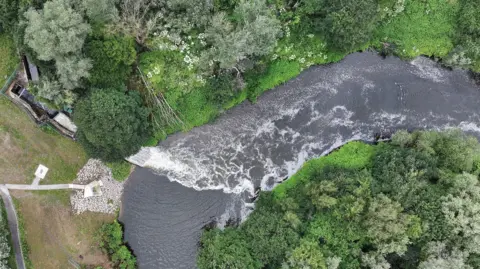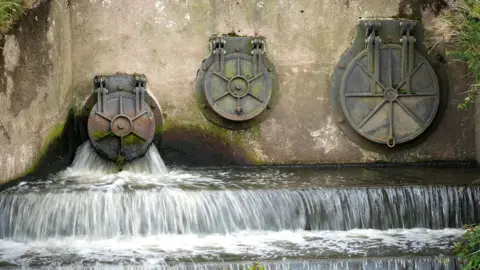Serious water pollution incidents up 60% in England, Environment Agency says
 Christopher Furlong/Getty Images
Christopher Furlong/Getty ImagesSerious pollution incidents by water companies have risen 60% in a year, according to the Environment Agency.
In total there were 2,801 pollution incidents in England in 2024, the highest on record, compared with 2,174 in 2023.
Of these, 75 were considered to pose "serious or persistent" harm to fisheries, drinking water and human health - up from 47 last year.
The Public Accounts Committee - a cross party group of MPs - called the level of pollution "woeful" and said regulators were "missing in action" in holding the industry to account.
The data from the Environment Agency comes ahead of a landmark review of the water industry, to be published on Monday.
The chair of the Water Commission, Sir Jon Cunliffe, will lay out his recommendations on how to improve the environmental and financial performance of the sector.
Reporting by the Guardian on Friday suggested this could include scrapping the regulator, Ofwat, altogether. A government spokesperson said: "We are not going to comment on speculation."
But speaking on the pollution data, Steve Reed, the Environment Secretary said: "These figures are disgraceful and are a stark reminder of how years of underinvestment and weak regulation have led to record levels of sewage polluting our rivers."
Industry group Water UK acknowledged that the performance of some companies had not been good enough.
"The Environment Agency is right to highlight underinvestment in infrastructure and maintenance as the major causes of these results," said a Water UK spokesperson.
The industry was set a target to reduce pollution incidents by 40% by 2025 against 2016 levels. But this has been significantly missed - levels reported in 2024 were more than double the original EA target.
Every year the Environment Agency records the number of times pollution such as untreated sewage is released from water company sites such as treatment works into the country's waterways.
Just three companies were responsible for the vast majority of the most serious incidents - Thames Water (33), Southern Water (15) and Yorkshire Water (13).
"These figures expose a brutal truth. Serious pollution incidents are rising, sewage discharges remain rampant, and our rivers are spiralling toward ecological collapse. This is not just regulatory failure; it is a national disgrace," said River Action CEO James Wallace.
"Thames Water, the most egregious polluter, should be put into special administration to start the reset," he added.
The company saw their levels of serious pollution double, and were the worst performer for reporting pollution events to the regulator.
 Getty Images
Getty ImagesEngland has a combined sewage system which means both rainfall and sewage are processed through the same system. Last year, rainfall levels were up, which could have overwhelmed some water company infrastructure.
However, despite variations in rainfall, discharges that result in serious pollution are a breach of their permits and legal obligations.
Many incidents are reported to the Environment Agency by the companies themselves, but of the 4,000 inspections carried out last year by the regulator it found nearly a quarter of sites were in breach of their permits.
Sir Geoffrey Clifton-Brown, head of the Public Accounts Committee which has published its report into the sector, strongly criticised the government and Agency for being "missing in action".
"Regulators are overwhelmed by the number of prosecutions and appear unable to deter companies from acting unlawfully. Government must act now to strengthen regulators and support their efforts to hold companies to account," he said.
The Committee said that the continued incidents are a result of the regulators - the Environment Agency and Ofwat - "fail[ing] to ensure water companies maintain vital infrastructure".
It is estimated that at current rates it would take companies 700 years to replace the entire water mains network.
Water UK said the failing infrastructure was as a result of the regulator refusing to allow the sector to raise bills to make the necessary investments.
"Investment in the sector has been suppressed with Ofwat prioritising short -term cuts to people's water bills over the long-term resilience of the network. This is finally being put right, with a record £104 billion investment over the next 5-years," the industry body spokesperson said.
As a result of this investment consumer bills are expected to rise on average by £123 annually - although for Southern Water customers this could be as much as £224.
But Sir Geoffrey told the BBC the lack of investment was the fault of the industry.
"I think over a number of years the water companies have been taking money out of the water system and channelling it away to their investors making their debts higher. Meaning, us, the customers are having a huge cost of that interest.
"Instead of paying that money towards improving capital investment, improving the capacity of sewage treatment plants or renewing leaky pipes," he said.
On Monday, Sir Jon Cunliffe, the head of the Water Commission will publish his recommendations into how the government might turn things around.
In his preliminary findings last month he echoed the conclusions of the PAC that there were "deep-rooted, systemic and interlocking failures", but was most critical of the regulators - the Environment Agency, Defra and Ofwat - for not providing proper oversight.
"We really need a regulator that is close to companies, that oversees them and monitors them continuously, as we do in financial services with the banks – not just so they can intervene early… but so they can support companies to improve," he told BBC Breakfast in June.
His recommendations next week could include an overhaul or significant changes to those regulators.
